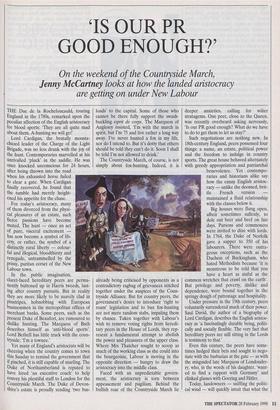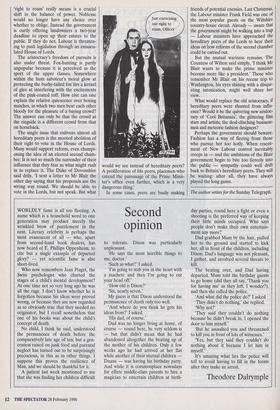`IS OUR PR GOOD ENOUGH?'
THE Duc de la Rochefoucauld, touring England in the 1780s, remarked upon the peculiar affection of the English aristocracy for blood sports: 'They are all quite mad about them. A-hunting we will go!'
Lord Cardigan, the brutally mousta- chioed leader of the Charge of the Light Brigade, was no less drunk with the joy of the hunt. Contemporaries marvelled at his unrivalled 'pluck' in the saddle. He was once knocked unconscious for 24 hours, after being thrown into the road when his exhausted horse failed to clear a gate. When Cardigan finally recovered, he found that the tumble had merely height- ened his appetite for the chase.
For today's aristocracy, many of them divorced from the physi- cal pleasures of an estate, such fierce passions have become Muted. The hunt — once an act of pure, visceral excitement has now become a symbol of lib- erty, or rather, the symbol of a distinctly rural liberty — colour- ful and illogical, bloodthirsty and renegade, untrammelled by the prissy, puritan corset of the New Labour town.
In the public imagination, claret-faced hereditary peers are perma- nently buttoned up in Harris tweeds, lust- ing after country pursuits. But in reality they are more likely to be suavely clad in pinstripes, hobnobbing with European businessmen in the metropolitan offices of merchant banks. Some peers, such as the present Duke of Beaufort, are rumoured to dislike hunting. The Marquess of Bath describes himself as 'anti-blood sports'. Lord Bethell has little truck with the coun- tryside: 'I'm a townee.'
Yet many of England's aristocrats will be cheering when the country comes to town this Sunday to remind the government that if pinched, it is still capable of snarling. The Duke of Northumberland is reputed to have hired 'an executive coach' to help convey his plentiful staff to London for the Countryside March. The Duke of Devon- shire's estate is proudly sending 'two bus- loads' to the capital. Some of those who cannot be there fully support the swash- buckling esprit de corps. The Marquess of Anglesey insisted, 'I'm with the march in spirit, but I'm 75 and live rather a long way away. I've never hunted a fox in my life, nor do I intend to. But it's dotty that others should be told they can't do it. Soon I shall be told I'm not allowed to drink.'
The Countryside March, of course, is not simply about fox-hunting. Indeed, it is already being criticised by opponents as a contradictory ragbag of grievances stitched together under the auspices of the Coun- tryside Alliance. But for country peers, the government's desire to introduce 'right to roam' legislation and to ban fox-hunting are not mere random stabs, impaling them by chance. Taken together with Labour's wish to remove voting rights from heredi- tary peers in the House of Lords, they rep- resent a fundamental attempt to abolish the power and pleasures of the upper class. Where Mrs Thatcher sought to scoop as much of the working class as she could into the bourgeoisie, Labour is moving in the opposite direction — hungry to draw the aristocracy into the middle class.
Faced with an unpredictable govern- ment, the aristocracy is torn between appeasement and pugilism. Behind the bullish roar of the Countryside March lie deeper anxieties, calling for wilier stratagems. One peer, close to the Queen, was recently overheard asking nervously, `Is our PR good enough? What do we have to do to get them to let us stay?'
Such negotiations are nothing new. In 18th-century England, peers possessed four things: a name, an estate, political power and the freedom to indulge in country sports. The great house behaved alternately with greedy appropriation and patriarchal benevolence. Yet contempo- raries and historians alike say how the canny English aristoc- racy — unlike the doomed, brit- tle French version maintained a fluid relationship with the classes below it.
Big houses were flung open, albeit sometimes sullenly, to dole out beer and beef on fair days. Parsons and commoners were invited to dine with lords. In 1764, the Duke of Norfolk gave a supper to 350 of his labourers. There were outra- geous exceptions, such as the Duchess of Buckingham, who hated Methodists because 'it is monstrous to be told that you have a heart as sinful as the common wretches that crawl on the earth'. But privilege and poverty, dislike and dependence, were bound together in the springy dough of patronage and hospitality.
Under pressure in the 19th century, peers voluntarily surrendered much of their power. Saul David, the author of a biography of Lord Cardigan, describes the English aristoc- racy as 'a fascinatingly durable being, politi- cally and socially flexible. The very fact that hereditary peers are still sitting in the Lords is testimony to that.'
Even this century, the peers have some- times hedged their bets and sought to nego- tiate with the barbarian at the gate — as with the misguided late Marquess of Londonder- ry, who, in the words of his daughter, 'want- ed to find a rapport with Germany' and clinked glasses with Goering and Hitler.
Today, landowners — sniffing the politi- cal wind — will quickly intuit that what the `right to roam' really means is a crucial shift in the balance of power. Noblesse would no longer have any choice over whether to oblige. Instead the government is curtly offering landowners a two-year deadline to open up their estates to the public. If they do not, Labour is threaten- ing to push legislation through an emascu- lated House of Lords.
The aristocracy's freedom of pursuits is also under threat. Fox-hunting is partly unpopular because it is perceived as the sport of the upper classes. Somewhere within the hunt saboteur's moral glow at protecting the bushy-tailed fox lies a kernel of glee at interfering with the excitements of the pink-coated toff. How else can one explain the relative quiescence over boxing matches, in which two men beat each other bloody for the pleasure of a baying crowd? The answer can only be that the crowd at the ringside is a different crowd from that on horseback.
The single issue that enlivens almost all hereditary peers is the mooted abolition of their right to vote in the House of Lords. Many would support reform, even champi- oning the idea of an elected second cham- ber. It is not so much the surrender of their influence that they fear as what might rush in to replace it. The Duke of Devonshire said drily, 'I sent a letter to Mr Blair the other day saying that his proposals are the wrong way round. We should be able to vote in the Lords, but not speak. But what would we see instead of hereditary peers? A proliferation of life peers, placemen who extend the patronage of the Prime Minis- ter's office even further, which is a very dangerous thing.'
In some cases, peers are busily making friends of potential enemies. Last Christmas, the Labour minister Frank Field was one of the most popular guests on the Wiltshire country-house circuit. Already — aware that the government might be walking into a trap — Labour ministers have approached the hereditary peers of the Lords to hear their ideas on how reforms of the second chamber could be carried out.
But the mutual wariness remains. The Countess of Wilton said simply, 'I think Mr Blair wants to make the prime minister become more like a president.' Those who remember Mr Blair on his recent trip to Washington, his eyes shining with a disqui- eting intoxication, might well share her view.
What would replace the old aristocracy, if hereditary peers were shunted from influ- ence? Would it be the quivering new aristoc- racy of 'Cool Britannia', the glittering film stars and artists, the deal-clinching business- men and meteoric fashion designers?
Perhaps the government should beware. Fashion has a way of fleeing from those who pursue her too hotly. When resent- ment of New Labour control inevitably creeps in — and the ambitions of the Blair government begin to bite too fiercely into the public — sympathy could well drift back to Britain's hereditary peers. They will be waiting: after all, they have always played the long game.
The author writes for the Sunday Telegraph.



























































 Previous page
Previous page